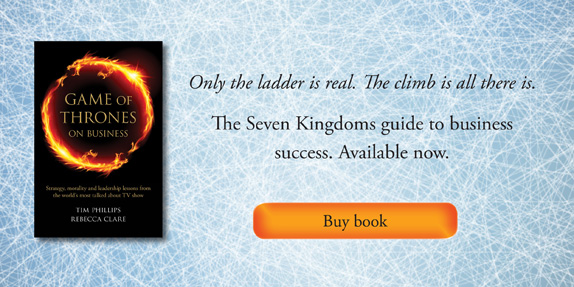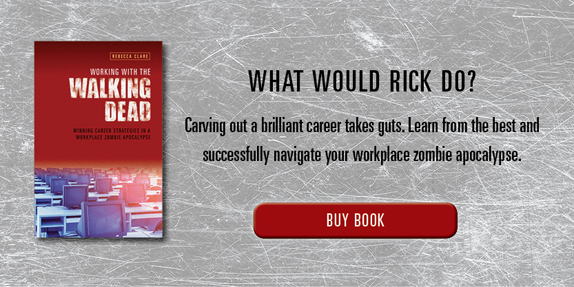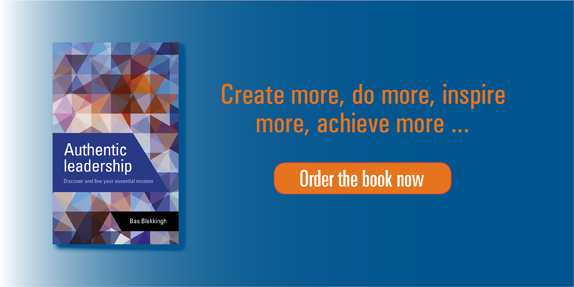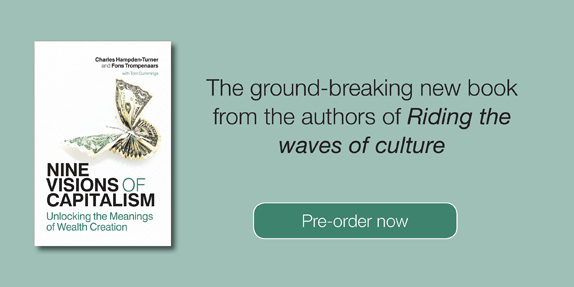Entertainment
Game of Thrones is full of business strategy – if you know where to look
3 May 2016 by Rebecca in Business and finance, Entertainment, Game of Thrones on Business
As our winter draws (reluctantly) to a close we plunge once more into a world where winter is coming, and brings with it sex, intrigue, swordfights, skulduggery and dragons. Unless (or possibly even if) you’ve been living on a wi-fi free desert island for the last five years you will realise we are talking about Game of Thrones, season 6 of which reached our screens this month. The programme makers have been teasing us for several months with what we do and don’t know; what may or may not have happened (yes, we’re talking Jon Snow here). One trailer had Bran declaring that ‘they have no idea what is going to happen’, something that over the years has proven true time and again. We knew the programme was fabulous entertainment right from the start of Season 1 but what we didn’t realise until Ned Stark lost his head was that in this series anything can happen. Bad things will happen to good people, heroes will die, villains will prosper and at no point will we feel this world is safe.
Game of Thrones is possibly the most widely discussed programme on television. With only ten episodes per season it is on our screens for little more than two months out of every year, yet the internet is alive year round with articles on the characters, photographic memes and speculation regarding what’s going to happen next. Why has this programme so inspired us? It has to be in the quality of the storytelling. Compelling characters, a mysterious universe that not even the characters who live in it understand (people thought dragons had died out years ago and nobody believed the white walkers were anything but a myth) and events that frequently extend beyond the protagonists’ control have us perpetually on the edge of our seat. Now, what if we could get people this excited about business?
Business is the dynamic force that shapes our economies and our lives. It’s crucial to the survival of western society as we know it. Business is about progress, wealth creation and opportunity. It should be exciting – fun, even – yet it is frequently discussed and taught in dry and theoretical tomes or through the clumsy medium of presentations reliant on screens of charts and bullet lists. You might not remember every single intricate detail of what happened in the last five seasons of Game of Thrones but we bet you could easily give a rundown of the key highlights. But how much of the last business seminar you attended can you remember? How much of it did you go home and relate to your family or discuss with your friends? How many memes did it generate?
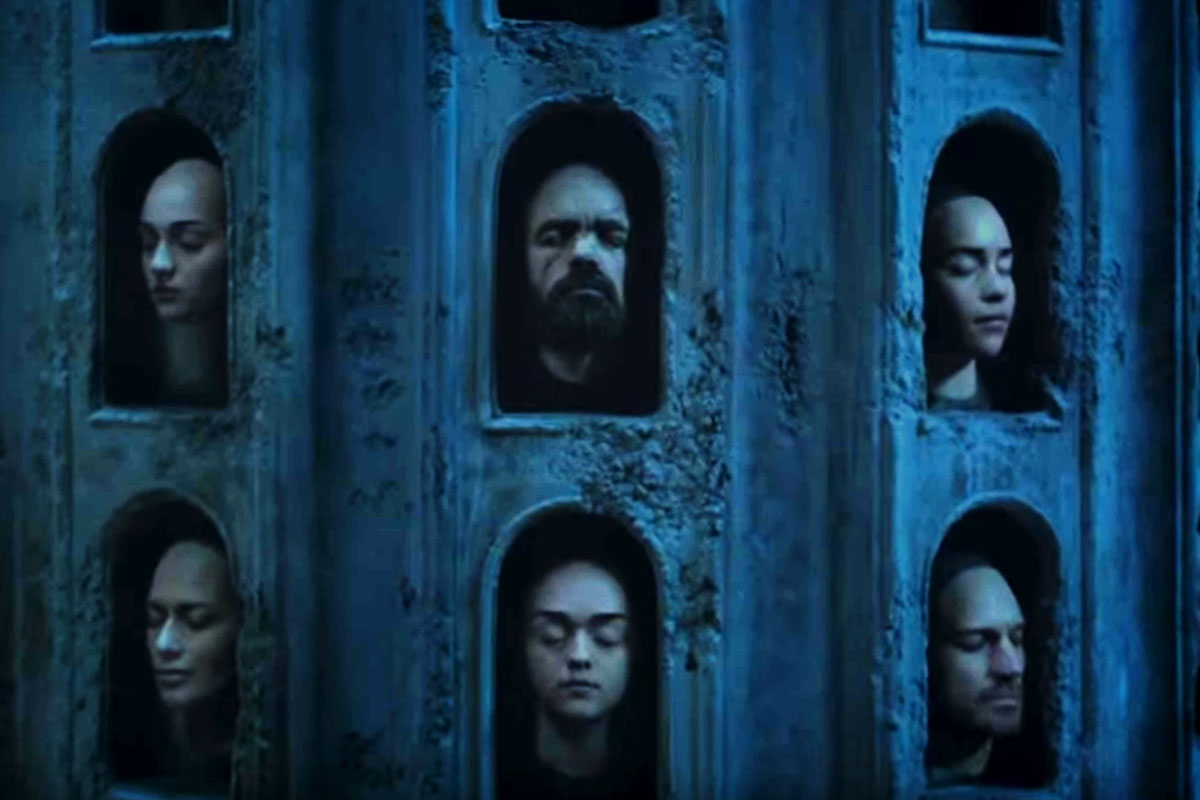
So by bringing the worlds of business and Game of Thrones together we hoped that we could imbue business theory with some of the excitement we feel when we watch the series. Once you take away the dragons and swordfights you start to see more similarities than differences. This strange medieval fantasy kingdom may not look a lot like our world but a lot of its essential ingredients – ambition, deceit, bravery, folly, triumph, disaster – feature in many a news story in the business press. Here are just a few key places where Game of Thrones and business touch.
Nice guys finish last: In the Game of Thrones universe it is not sufficient to be morally right like Ned Stark and his family; one must also be a clever – and lucky – player of the game. The same can be said for business: in this high-stakes world success is not granted simply to those with the best ideas, those who entered the market first or even those who put in the most work. Business, like Game of Thrones, is full of surprises and those who make it to the top do so by not only staying one step ahead of the game but learning to control it rather than having the game play them. Lose focus even momentarily and you lose your advantage. This does not mean you have to be an unprincipled swine to get ahead: the dastardly Petyr Baelish is the exemplary game-player but Daenerys too has demonstrated strategic skill while maintaining a strong moral code.
It’s not what you know but who you know: In Game of Thrones that also includes what you know about them, and how you use it. In business it usually means networking rather than blackmail (though of course that’s not unheard of either). Cersei, Lord Varys and Petyr Baelish all operate networks of people to bring them intelligence on other game players and help them leverage their strategic advantage. So vast is Varys’ network in fact that he is nicknamed the Spider. We all know we need to network more but often only think of it when we need something (a recommendation, a job). But networking is a daily business – Ned Stark left it too late to try to cultivate relationships, staying holed up in Winterfell after the war, and look how well that turned out for him.
You know nothing: Well all right, not nothing, but you rarely have all the information and skills you need to succeed entirely solo. Which is why you need to develop a great team around you. Daenerys has many queenly attributes but she could not have got where she is now without Jorah’s strategic advice, Daario’s muscle, Missandei’s cultural knowledge, or her dragons. A weak spot left unguarded provides an advantage for a rival. Which is why truly successful individuals know themselves well enough to pinpoint their weaknesses and take steps to do something about it.
You win or you die: If you want to succeed you have to be prepared to fail too. But that need not mean taking foolish risks, plunging into the unknown and hoping for the best. Instead you need to follow Baelish’s example and learn how to take calculated risks. Petyr Baelish has been the invisible hand, influencing events, even orchestrating the death of John Arryn, which began the war of the five kings. But at no point has he got those hands truly dirty. He’s always kept at a safe remove from the action – we know he was behind Joffrey’s murder but nobody in the world of the programme could connect him to it. His options are still open and he can pull away from a plan at any time. If you are patient and take incremental, small risks you stand a much better chance of achieving your goals than if, like Renly, Robb or Viserys you insist on going in all guns blazing.
Once you start seeing similarities between Game of Thrones and business it is hard to stop. Next time you have to give a business seminar why not throw in a few examples – it’s almost certain to get you more notice than yet another pie chart, spreadsheet or bullet list.
Game of Thrones on Business by Tim Phillips and Rebecca Clare is available to buy. To be in with a chance to win a free copy, tweet us your top business tip from the show to @Infinite_Ideas
Career lessons from The Walking Dead: be adaptable
16 March 2016 by Catherine Holdsworth in Business and finance, Entertainment, Working With The Walking Dead
Rick, Morgan and the other characters who have lasted share in common an ability to adjust to change; to understand that the important thing is to work with the world as it is now not as it used to be or as they wish it could be again. Rick gets into the swing of the new world very quickly, from waking up, dazed, in the hospital to battling his way out of Atlanta in only a few days. Morgan too was quick to adapt. While his wife was looking to the past – grabbing the photo albums – he was preparing himself for the apparent present and the likely future. He had already worked out what the world was like at that time and was doing what was needed to cope with it, whereas she was just thinking of what she would miss from the past, or need when the current situation reverted to ‘normal’.

Many fields, such as law, accountancy and medicine require that practitioners keep up to date with changing processes, legislation or methodology. It should be a requirement for you, too, if you want to get ahead. Change is inevitable: once you have accepted that you can begin to move forward.
Ask what is changing
In The Walking Dead the changes are both catastrophic and sudden. Nobody really had time to prepare for the new reality or take steps to avoid it. As we see in the back story show, Fear The Walking Dead, a problem that started small rapidly escalated as the authorities misunderstood both the problem itself and its potential lasting impact. In a huge city like Los Angeles the virus quickly spread among the population.
In your working life changes can be sudden and catastrophic, but more commonly change is gradual. Is your industry changing – have you read articles about new technologies, routes to market, operating systems? What are your organization’s competitors doing and what might the implications be for you if your business follows the same route? How is the economy faring? You need to keep your eyes and ears open – you stand a better chance of surviving change if you are well informed.
Work out what you need to do to be part of the change
Having accepted that the world is changing Rick and Morgan both work out what they need to do to be part of the new world.
Seeing the changes is only the first step; understanding what you need to do requires greater thought. So Tara and her family noticed a change and realized the need to survive, but they thought the safest thing to do was hole up in their flat with all the food and water that was available. Not only was this a short-term plan but it also meant they weren’t out in the world learning more about the changes taking place. If it had not been for the presence of The Governor when their father died Tara, her niece and sister may also have been turned. Not everybody is able to make the creative leap from observation to a plan of action, so if you can do it you will have a distinct advantage over your contemporaries. As Henry Ford famously said, ‘If I had asked people what they wanted, they would have said faster horses.’ While others thought change meant more of the same but better, Ford approached the advancing world from a more creative angle. .
Perhaps you work in a business that sells two different products or services. You note from reading the industry press that a new technology has been developed, and you realize that said technology could revolutionize one side of the business, the side you are not currently involved in. So what do you need to do to arm yourself with the know-how and credentials to switch to the side of the business that is shortly to be in the ascendancy?
Take steps to achieve that
When Rick decides he needs to survive and works out he needs weapons to help him he goes to the logical place – King County Sheriff ’s Department, where he used to work – and stocks up on what guns and ammunition remain. Having heard that there is a refugee centre in Atlanta, where the Center for Disease Control is also located, he sets off in that direction, calculating that his best chance for survival lies there.
It is no good knowing what you need to do in order to be part of the change if you do not act on that information. Is there a course you can attend that will give you the background or qualifications you need in order to be part of the new world? Perhaps you need to read round the subject – could you do this as part of your daily commute? Ambitious and committed people use every opportunity they have to further their careers – time on the train spent reading a blockbuster novel, no matter how entertaining, is time wasted if you could be immersing yourself in future-facing thinking. And don’t forget the N word – networking – maintain good connections with others in the industry or other parts of your organization. They can be both mines of useful information and routes to the next phase of your career.
Zombie identification for beginners
25 February 2016 by Catherine Holdsworth in Business and finance, Entertainment, Working With The Walking Dead
By now you should have had enough time to settle in to watching the rest of season 6 of The Walking Dead and you may have noticed a few parallels between the show and your work life. However, if you’re wondering what on earth we’re on about, then perhaps you need some help identifying the zombies of your office. It may surprise you to learn that the office joker is a walker underneath all the bravado and banter. And did you know that what you have for lunch can indicate whether you or your colleague are also walkers? It can be difficult to tell who is and who is not a zombie in large offices but here are some helpful tips to help you be on the lookout and hopefully help you avoid the pitfalls of becoming one yourself.
They’re followers. Watch a herd of walkers and you will note that they all move in the same direction at the same speed, only changing course in response to noise or movement. There’s no independent thinking, no courage or daring. Thus it is with the walkers in your workplace – they do the job as prescribed, and no more.
They arrive on the stroke of 9 and leave at exactly 5. They go to lunch at the same time every day, refuse to stray outside the bounds of the system (‘More than my job’s worth’) and are careful to avoid doing anything not in their job description. Their job is just something they have to do 35 hours a week in order that they can collect a pay cheque every month. It’s something to be got through and survived. They slow down projects by insisting they can only do the work within their fixed systems and schedules.
They’re the office joker. Office jokers may seem happy but this is just a way of getting through the day – it’s the only way they get meaning from being at work. They carve out a niche for themselves – everybody knows who they are – but they are never going to be taken seriously. Which means their career progress within a particular organization is going to be limited. They distract colleagues from their work and disrupt company culture.
 They resist change. Regardless of whether it’s moving the coffee machine, changing the invoicing system or a complete departmental restructure they don’t like it and it’s not going to work. In fact they’ll do all they can to ensure it doesn’t. You’ll never see the resistors put as much effort or creative energy into anything as they put into trying to keep things the way they’ve always been. Not all changes are good and some have huge implications for the business and the individuals working within it but these people haven’t thought deeply about the changes – they just dislike them because they are not what went before.
They resist change. Regardless of whether it’s moving the coffee machine, changing the invoicing system or a complete departmental restructure they don’t like it and it’s not going to work. In fact they’ll do all they can to ensure it doesn’t. You’ll never see the resistors put as much effort or creative energy into anything as they put into trying to keep things the way they’ve always been. Not all changes are good and some have huge implications for the business and the individuals working within it but these people haven’t thought deeply about the changes – they just dislike them because they are not what went before.
They’re always right but they’re never willing to put their money where their mouth is. This kind of workplace walker could spend the whole day telling colleagues why management is doing everything wrong, and will bore you for an entire lunch hour if you’re unlucky enough to encounter them in the canteen. They particularly love introducing new recruits to all the flaws of the department or organization – it gives them a sense of power. They create a bad atmosphere in a team, making their manager’s job a lot harder.
It’s not their fault. Zombies never own up to their mistakes, not even to themselves, which means they can never learn from them. With the workplace walker there’s always a reason for an error but it’s because of some failing in the system or a problem created by one of their co-workers: ‘I wasn’t given the figures from accounts in good time’, ‘I only did what the project manager told me’, ‘that’s the answer the system gave when I put the information in’. They can become aggressive if any suggestion is made that they could have done something to mitigate the situation and make more work for their manager and colleagues because somebody else has to sort out their errors.
They don’t stand out, or they stand out for the wrong reasons. A typical office zombie just won’t get noticed by management outside their department. If they do catch somebody’s eye it’s likely to be for the wrong reasons: ‘Oh yeah, the guy who’s always playing practical jokes’, ‘Is she the one that really kicked up a fuss when we moved the coffee machine?’ This is not the route to promotion.
They eat the same lunch every day. In 2015 research undertaken for butter manufacturer Lurpak into the eating habits of 2,000 office workers revealed that 32 per cent of UK workers eat exactly the same lunch each day – a cheese sandwich. The average worker has been doing this for almost four and a half years and despite the monotony, 40 per cent of respondents said that lunch is usually the highlight of their working day. That’s just depressing, and seems to be further evidence of a lack of care about work, that it is something routine, just to be got through. In order to work at your best you need to be in good health; nutritionists advise that to help achieve that goal we should eat a wide variety of foods; just one reason to shake up your lunch habits.
Just as the humans in the series all carry the virus and are capable of becoming walkers, we all have the facility to fall into workplace zombie habits. But now you know what to look out for you’ll be able to catch yourself if you ever seem to be behaving like a walker and pull yourself back onto the path to career success.
Super Thursday for Infinite Ideas
8 October 2015 by Catherine Holdsworth in Book publishing, Current events, Entertainment
It’s Super Thursday in the publishing world, which is a bit like Christmas morning for us. We’re off to the bookshops after work to see all the beautiful, colourful covers adorning the tables like waking up and seeing what Santa has brought us. Naturally we already have bookshelves at home heaving with unread tomes and we look forward to adding to the large stacks that we may take to the beach next year. What can we say, we like choice.

Infinite Ideas does not have a book released this year, however we do have a super exciting Christmas list. There really is something for everyone from business stocking-fillers, to leadership lessons for the business aficionado in the family. However, the title that we are most excited about is all about Christmas or, more precisely, Yule. Catherine Cooper’s new book, The Wichen Tree, will be published at the end of November and is another very exciting Jack Brenin adventure.
Jack, having grown up in Greece, has never seen snow so this Yule is especially exciting for him as well as coming across many magical creatures and places in the lead up to Christmas.
 If you’re new to this series, the first book, The Golden Acorn, is available for free on Kindle. There’s just enough time for you to dive into this magical series before the fifth book comes out. We’re nice like that, we thought we’d give you a bit of extra time to get hooked on the series! If you’re already a fan, then there’s still time to put it on your Christmas list and mark it on your calendar as there are just over six weeks until you can get your hands on this great book.
If you’re new to this series, the first book, The Golden Acorn, is available for free on Kindle. There’s just enough time for you to dive into this magical series before the fifth book comes out. We’re nice like that, we thought we’d give you a bit of extra time to get hooked on the series! If you’re already a fan, then there’s still time to put it on your Christmas list and mark it on your calendar as there are just over six weeks until you can get your hands on this great book.
Also, the cover is very cool and very Christmassy, don’t you think? (Not that we’re endorsing getting this excited about Christmas already, but if other publishers are, then we will shamelessly jump on that bandwagon!)
How to win the Great British Bake Off
7 October 2015 by Catherine Holdsworth in Business and finance, Current events, Entertainment
As rain hits Britain today and the leaves suicidally fall to the ground, it signifies the end of summer and the final of the Great British Bake Off. We’ve been hooked in the office this year, and I’m sure everyone around the country is waiting with baited breath for the final this evening (that is, unless the world hasn’t ended before then).
The three finalists, Nadiya, Tamal and Ian have fought off stiff competition to get to the last week and we’ve come up with some career lessons that you can learn from these excellent bakers:
Nadiya
We’re not going to lie, Nadiya is our favourite contestant, perhaps in the history of bake off. We didn’t think we could find a funnier contestant than Norman but Nadiya has surpassed his wit and she is a much better baker. Nadiya has been star baker three times so far (tied with Ian) so she is in a strong position going into the final. However, her journey there has not been easy. In the beginning, Nadiya struggled with the technical challenges, often coming last or near the bottom. When faced with unknown situations, it can throw us off guard. When we’re out of our comfort zone, having to work with new clients, or having to clear up someone else’s (or your own) blunders, it can be hard to stay cool and get a suitable outcome for your business.
Nadiya has, at times, been anything but cool under pressure (the paperclip and soufflé incident from last week, for example) and she has a tendency not to believe that she is capable. However, Nadiya’s creativity and willingness to take risks has got her to the final. As with any strong leader, capability is everything. You can only fake it for so long and, trust us, your employees will know if you are ineffective when it comes to making tough decisions or coping when times get tough.

Ian
Ian, like Nadiya, is going into this final with three star baker titles to his name. He is competent and able to cope under even the toughest of pressures (and he was the first to receive the Mary Berry wink this season!) However, Ian’s stars were all awarded towards the beginning of the series, he peaked too early it would seem. Either that or his competitors were able to improve quickly and catch up with him. There are also rumours that he has been getting specialist training from a professional chef to up his game (we are not endorsing these rumours, nor are we endorsing Ian to be honest). When you’re competing with your colleagues or other businesses, it is important not to burn out too quickly. Ian’s arrogance is also something that could cost him the title.
One of the great things about Bake Off is the camaraderie between the contestants (well, except for bin-gate, but we won’t open that can of worms) and yet Ian seems to have remained a lone ranger in the tent. Perhaps his strategy is to keep his skills to himself, or to remain apart so that he can focus on making his bakes better than anyone else’s. However, when you’re in the ruthless world of business, sometimes buttering up (pun intended) the competition can be beneficial for both parties. Finding a way that both companies can work together and sharing knowledge is not always a bad thing. Though Ian’s chocolate well was a bit, well, anticlimactic, one can’t deny that Ian has great initiative and creativity, demonstrating his ability to make his own cake moulds. Seeing the problem from another angle and knowing what you can bring to the table can be great when leading a team and being familiar your strengths when times are tough can help get you out of a jam. But they could also alienate you among your colleagues, which may lead to mutiny in the ranks.
Tamal
Tamal is our favourite anaesthetist and our second favourite finalist of this year’s Bake Off. Tamal has been the lucky recipient of the Hollywood Handshake (not quite an Oscar!) and is adept at his baking skills. However, Tamal’s weakness is timing. When you’re up against the wall with a particular project, time management is everything. Being a successful leader is about how you manage your employees and delegate to make things work as efficiently as possible.
Tamal is this year’s unlikely heartthrob (we wouldn’t say no to one of his vol-au-vents) and has taken it all in his stride. In business, like with everything, there will be peaks and troughs in your success. Tamal never let his successes or disasters go to his head, and he certainly isn’t signing up to be the latest Cosmo centrefold. Being able to juggle his high-pressured job with baking every week and still coming out on top is a skill that we can all learn. Sometimes, though, it’s best to keep things simple.
Though we really liked Flora, it was clear that time and again, she didn’t listen to Mary and Paul’s advice and gave herself too much to do. Superiors try to guide you in the right direction and having too much on your plate can be catastrophic for your career and your personal life if not balanced well. Dorret was eliminated in week three after she had scraped through the first two weeks. She was the recipient of the Mary Berry scowl when she confessed one week that she had bought her cookie cutter (rather than make it herself) and the next week that she hadn’t even practiced her bake. Not preparing is essentially, preparing to fail. Showing up is only half the battle, when presenting, working in a team or just working on a solo project, being prepared is key to survival in the cut throat world of business.
Whoever wins tonight (go, Nadiya!) it’s definitely been a great series and we have been lucky enough, this year, not to have had too many baking blunders ourselves. There are many lessons we can take away from watching people bake cakes in tents each week, and Infinite Ideas has lots of advice on leadership, management and other ways to run your business. Perhaps you need help on how to Cultivate a cool career or you would like to learn more about Authentic leadership, we have a whole library waiting for you.
Was Steve Jobs a conscious capitalist?
30 September 2015 by Catherine Holdsworth in Business and finance, Entertainment, Nine visions of capitalism
Unless you’ve been hiding under a rock for the past few months, then you may have heard about a new film coming out this Christmas about the late Apple CEO, Steve Jobs, entitled, Steve Jobs. With the star Michael Fassbender already tipped for Oscar success, the film has been plagued with scandal since before it was even put into production. Though Fassbender may have done a good job, after the Sony hack, it was revealed that writer Aaron Sorkin didn’t even know who he was. How opinions can change.
Two trailers have been released so far for the film and, if they’re anything to go by, it doesn’t look like Jobs was the type of person you’d want to invite round for a cup of tea. So focused on his job was he, that he neglected his daughter in pursuit of building up his company into an empire. That he did. There are Apple products all around you, all you have to do is step out of your door and you’ll see someone on an iPhone, chatting, texting or instagramming their lives. Apple is more than a technology company, it is a lifestyle for millions of people. Every time a new model of iPhone is released, there are people who are selling their grandmother to be the first in line to get their hands on the new model. We all remember that rather odd woman who had queued in New York for a new iPhone, just because she thought she should, and had no idea why she really wanted it. Apple has saturated the market so much that, though Microsoft and Bill Gates’ empire is still incredibly successful, even those who own a PC are aware of how good Apple is. To collect them all, as Pokemon fans would say, is to shell out thousands of pounds, and then more to update your collection. When does it end? And should I be ashamed of my 2009 iPod nano that is hiding in a drawer at my parents’ house?
That iconic combination of jeans and polo neck has cemented Jobs as an easily-recognisable figure and the face of Apple. There’s no doubt that Jobs achieved extraordinary things with Apple, but is the company promoting conscious capitalism? Charles Hampden-Turner and Fons Trompenaars, authors of Nine visions of capitalism, suggest that Jobs and the Apple corporation were winners with their very first product:
The computers produced by Acorn and the BBC Micro ‘failed’ to match the appeal of the Apple I. In reality there were a number of contributing factors: the USA has a much larger and more demanding market; California legislators approved a free Apple for every public school, provided that school purchased a second; a new mass market was created that shut imports out; and Apple was pitched in terms of personal liberation from IBM, the rebellion of a defiant citizenry against a corporatist ethos.
So Apple asserted that it was a cool company from the start. We all remember those really fun Apple Macs that were brightly coloured, they were not designed to appeal to Wall Street stockists, they were for the young, hip students and start-ups. They epitomise the rise of Silicon Valley: exciting, fresh and completely different to the stuffy companies that make you work ridiculous hours and resent your job. Yet Apple too makes you work ridiculous hours, by providing free food, gyms and making the office a welcoming environment, employees don’t want to go home. Essentially, they are in it for life (or at least as long as they work there). The opportunity for Netflix and chill is sadly lacking. Last October, Apple HR demonstrated it’s conscious capitalism by unveiling its philanthropy programme, and it would match any donation to causes that its employees made.

In an age where most all of us in the Western world own a laptop, smart phone and most likely an Apply product or two, these companies are literally part of millions of people’s lives. Capitalism affects us on a global scale and Apple’s stocks just keep growing. New technologies are being developed and to stay current, you have to stay ahead of the competition. But to appeal to the masses and to remain in our pockets, you have to be conscious of what the consumer wants. Earlier in the year, when Taylor Swift called Apple out on their policy of not paying artists for the first three months of Apple Music, Apple responded, ‘we hear you, Taylor Swift’ in an attempt to appeal human, they came out smelling of roses when they could easily have ran into a PR blunder. By looking like they care about what Swift and other artists had to say, they showed their conscious capitalist ethics.
Whether you believe that Jobs was a conscious capitalist or not, he managed to create a company that has changed millions of lives and made his mark on the twenty-first century. I’m not sure whether the film is supposed to make Jobs look like a complete tool when it comes to his personal life, but perhaps it is showing us that, for Jobs, the company came first, and as a consumer, that makes me feel a lot better!

